Conrad Johnson's Blog, page 7
February 18, 2020
Quantum Computing: The Future is Now

A quantum computer may have solved a problem in minutes that would take the fastest conventional supercomputer more than 10,000 years. A draft of a paper by Google researchers laying out the achievement leaked in recent days, setting off an avalanche of news coverage and speculation. While the research has not yet been peer-reviewed – the final version of the paper is expected to appear soon – if it all checks out it would represent “the first computation that can only be performed on a quantum processor”. That sounds impressive, but what does it mean?Read more
Published on February 18, 2020 18:44
The Gospel According to Greta
 Last year saw the canonisation of Greta Thunberg. Her formal elevation to sainthood came as no surprise. She had already achieved an untouchable status. Her utterances such as: ‘I want you to panic, I want you to feel the fear I feel every day’ (Jan. 2019, World Economic Forum) and ‘We are in the beginning of a mass extinction, and all you can talk about is money and fairy tales of eternal economic growth. How dare you’ (Sept. 2019, UN General Assembly) have been received with hushed awe (though I confess their vacuity makes me think that the wag who said Greta learned all her climate science from the Ice Age films might be correct).Continue to article
Last year saw the canonisation of Greta Thunberg. Her formal elevation to sainthood came as no surprise. She had already achieved an untouchable status. Her utterances such as: ‘I want you to panic, I want you to feel the fear I feel every day’ (Jan. 2019, World Economic Forum) and ‘We are in the beginning of a mass extinction, and all you can talk about is money and fairy tales of eternal economic growth. How dare you’ (Sept. 2019, UN General Assembly) have been received with hushed awe (though I confess their vacuity makes me think that the wag who said Greta learned all her climate science from the Ice Age films might be correct).Continue to article
Published on February 18, 2020 17:37
January 28, 2020
Do Aborted Babies Go Straight to Heaven?
What about those who never heard the gospel? What about aborted babies or infants who die? What happens to them? Listen to Martyn Lloyd-Jones' take on this issue:
A Sermon on Romans 10:14-17How then will they call on him in whom they have not believed? And how are they to believe in him of whom they have never heard? And how are they to hear without someone preaching? And how are they to preach unless they are sent? As it is written, “How beautiful are the feet of those who preach the good news!” But they have not all obeyed the gospel. For Isaiah says, “Lord, who has believed what he has heard from us?” So faith comes from hearing, and hearing through the word of Christ. (ESV)CLICK HERE TO LISTEN
A Sermon on Romans 10:14-17How then will they call on him in whom they have not believed? And how are they to believe in him of whom they have never heard? And how are they to hear without someone preaching? And how are they to preach unless they are sent? As it is written, “How beautiful are the feet of those who preach the good news!” But they have not all obeyed the gospel. For Isaiah says, “Lord, who has believed what he has heard from us?” So faith comes from hearing, and hearing through the word of Christ. (ESV)CLICK HERE TO LISTEN
Published on January 28, 2020 12:36
January 20, 2020
Classic Book Review: R.A. Webb and The Doctrine of Adoption
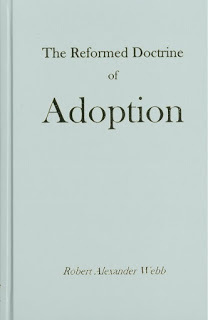
R.A. Webb's, The Doctrine of Adoption, is a rare gem to be found in the house of many mansions within the Kingdom of God. This thin, nondescript volume deals compactly and definitively with a doctrine that is too often neglected or only been given a passing reference to in the running centuries of church historical thought. Webb rectifies this theological lapse with uncanny precision and stylistic rhetoric that is both simultaneously simple and elegant .
The main issue that Webb exegetes is our standing before God the Father before and after regeneration in believers through the atoning sacrifice of Christ on the cross. Are we now sons who cry, "Abba, Father?" or are we also bondservants who have been set free from the bondage of sin and slavery which we are all born into because of Adam and Eve's disobedience? Or are we both? And, if so, what determines and delineates each in the eyes of God as revealed in Scripture?
Perhaps the most comprehensive treatment of this problem is in Christ's own words when he dealt with Pharisees in John 8: 31-47 which bears reproducing in full here from the NIV:
To the Jews who had believed him, Jesus said, “If you hold to my teaching, you are really my disciples. Then you will know the truth, and the truth will set you free.”
They answered him, “We are Abraham’s descendants and have never been slaves of anyone. How can you say that we shall be set free?” Jesus replied, “Very truly I tell you, everyone who sins is a slave to sin. Now a slave has no permanent place in the family, but a son belongs to it forever. So if the Son sets you free, you will be free indeed. I know that you are Abraham’s descendants. Yet you are looking for a way to kill me, because you have no room for my word. I am telling you what I have seen in the Father’s presence, and you are doing what you have heard from your father.” “Abraham is our father,” they answered.“If you were Abraham’s children,” said Jesus, “then you would do what Abraham did. As it is, you are looking for a way to kill me, a man who has told you the truth that I heard from God. Abraham did not do such things. You are doing the works of your own father.”“We are not illegitimate children,” they protested. “The only Father we have is God himself.”Jesus said to them, “If God were your Father, you would love me, for I have come here from God. I have not come on my own; God sent me. Why is my language not clear to you? Because you are unable to hear what I say. You belong to your father, the devil, and you want to carry out your father’s desires. He was a murderer from the beginning, not holding to the truth, for there is no truth in him. When he lies, he speaks his native language, for he is a liar and the father of lies. Yet because I tell the truth, you do not believe me! Can any of you prove me guilty of sin? If I am telling the truth, why don’t you believe me? Whoever belongs to God hears what God says. The reason you do not hear is that you do not belong to God.”At first glance, this passage seems to be explaining the concept of sonship only but if we examine it more carefully, Christ also deals with servantship. Let's look at how Webb distinguishes between the two.
Strictly speaking, all of us, whether we are believers or not, are sons of God by causation as the Pharisees in the above passage correctly maintained by way of their physical birthright from Abraham and his descendants. Webb derives from Scripture and logic that this causative, or traducianist, belief really extends further back than just Abraham but all the way to the Garden and to Adam and Eve. Christ implies this by His statement in verse 34 when He says, "everyone who sins is a slave to sin." Certainly, you must agree that sin did not begin with Abraham but with Adam. Therefore, because of the first man's disobedience, everyone is born causatively into sin which the Psalmist affirms: "Surely I was sinful at birth, sinful from the time my mother conceived me." (Psalm 51:5) But the question remains, if man was created in God's image, then how can such a creature sprung from the very loins of God's will be imperfect potentially? How much of the Divine nature, if any, was imputed to man at his formation from dust? If God breathed His spirit into man to give him life, how could that pure and Holy Spirit become corrupt? Doesn't that imply that God can be corrupt also? Here is where the difficulty lies and where Webb finely navigates the different theories, identifying each one and eliminating wrong premises using impeccable logic and comparative rhetoric as skillful techniques.
And as Christ interweaves sonship and servantship in the John 8 passage above (which completely went over the heads of the Pharisees), Webb masterfully dissects the two in this book and shows how, in effect, man is both servant and son, first falling from God's favor through sin (yet remaining causatively related) but then through justification, atonement and regeneration, becoming heirs and adopted children.
The fine details of Webb's theological logic is far too dense and detailed to be dealt with in a book review, but this partial summary of the key concepts in the last chapter of The Doctrine of Adoption may serve to whet the thinking man's appetite and to purchase this rare, collectible for only ten lousy dollars via the private store's website linked above in the opening line of this post. And I leave you with these pearls of wisdom in Webb's own words and rhetorical style, gentle reader, after he had thoroughly dealt with the Doctrine of Adoption which many of the 'greater' theologians in church history who have avoided or treated only nominally in their works:
Let us keep these two ideas separate: Jesus died to reconcile God to men; the Spirit was granted to reconcile men to God. The atonement made God a Father; the Spirit makes man a son. Christ's work is subjective to God, but objective to men; the Spirit's work is objective to God, but subjective to men. Christ does for us; the Spirit does in us. Jesus baptized no man; all true baptism is by the Holy Spirit; for the Son, that God might be made a redemptive Father; for the Spirit, that man might be made a redemptive son. There are two terms to every relation; and the two terms of this particular relation are God and man. Each is angry with the other; each must be placated. It is the office of Christ to placate the Father; it is the office of the Spirit to placate the sinner. The technical name for the power by which the Spirit applies the benefits of Christ's redemption is Grace (179).
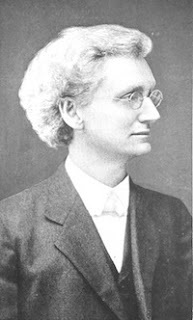 Robert Alexander Webb
Robert Alexander Webb1856-1919
Published on January 20, 2020 00:54
January 14, 2020
History of the Rapture
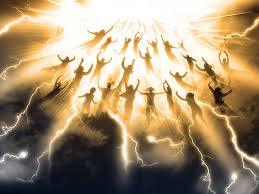
Origins of the Rapture actually don’t go back that far, but farther than you may have been taught (if you were taught!).
First of all, the word ‘rapture’ is not even included in the Scriptures, and was unknown as a theology or a doctrine by the Church for well over 1,800 years.Where then did it come from and when did it begin? Its origins are in the counter reformation move of Papal Rome in the 16th century after Martin Luther nailed his 95 thesis to the church door in Wittenberg on October 31, 1517. It is less well known that Pope Leo X authorized three Jesuit Priests to reinterpret Daniel’s 70 weeks of prophecy; the Book of Revelation; and Ezekiel. The goal of these jesuits was to take the heat of the reformation away from the papacy and the protestant association of the Anti-Christ with the pope. Continue to article here
Published on January 14, 2020 05:58
January 3, 2020
The Doctrine of the Remnant
This is from D.M. Lloyd-Jones: The First Forty Years by Iain H. Murray, page 152. A highly recommended biography of the late, great Doctor.
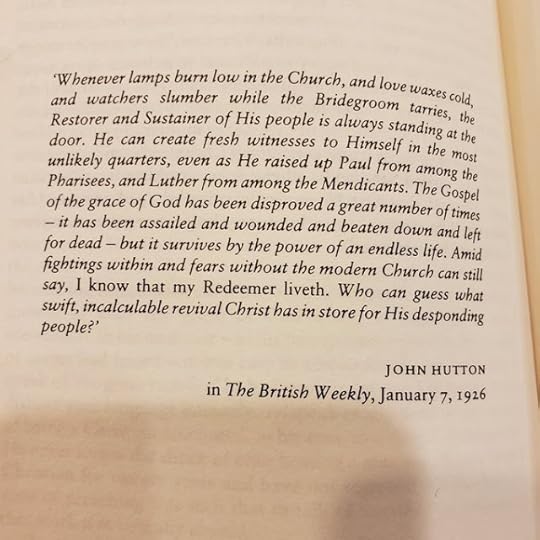

Published on January 03, 2020 22:34
December 18, 2019
Brief Biography of R.A. Webb-Southern Man of God
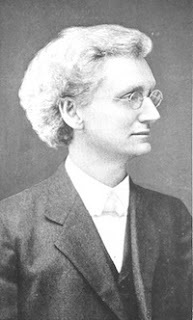
Robert Alexander Webb, the third child of Robert Clark and and Elizabeth Eaton (Dortch) Webb, was born on the twentieth day of September, 1856, in Oxford, Mississippi. His father served as a Ruling Elder in the Presbyterian Church and his children were from infancy brought up according to the strict methods of the Presbyterian Church of their day. In 1871 the family removed to Nashville, Tennessee. The mother died in 1873 and the summer of that year Nashville was visited by a very severe epidemic of cholera. Robert had a very violent attack of this dreadful disease. He was brought near to the gates of death. Convinced that his recovery was due to the special blessing of God, be interpreted it as God’s confirmation of his call to the ministry of the Gospel. Continue to article.
Published on December 18, 2019 22:30
December 1, 2019
Past Due Book Review: From Paradise to the Promised Land
Imagine taking a journey through ancient biblical history in almost three dimensional virtual reality--a full immersion experience with all the nuances, textual references and detailed commentaries that you could hope to find in a book anywhere. T.D. Alexander's , From Paradise to the Promised Land: An Introduction to the Pentateuch, offers such an opportunity if you bypass Part 1 of the book, "Pentateuchal Criticism", which wastes space trying to justify the now almost totally debunked Documentary Hypothesis which dominated scriptural scholarly thinking between the latter part of the 19th century and early part of the 20th.
Needless apologetics aside, this book guides the reader from Genesis through Deuteronomy in a taxonomical format that encompasses nearly all aspects of revelatory purpose--historically, doctrinally and practically. Part 2, "The Main Themes of the Pentateuch", is where this work earns its merit and each chapter in this section is brilliantly divided into headings that even the most orthodox of Puritan scribes and theologians would be proud of. And after all is said and done whether Mr. Alexander would admit to it or not, his reverence and exegesis of this section of the Old Testament is orthodox to its core.
For example, consider a typical chapter division from the section entitled, "The Royal Lineage in Genesis":SummaryIntroductionThe Structure of GenesisThe Chosen 'Seed'The Lineage of AdamConclusionNew Testament ConnectionsAlexander maintains this finely structured approach all the way through, highlighting what he arbitrarily (but arguably on-target) designates as important thematic motifs for each section, ending with the chapter, "Why Israel?" which is refreshingly balanced in its conclusions and avoiding the pitfalls of controversy that surround political Zionism so prevalent today among unenlightened evangelicals. (For further discussions regarding geographical Israel and end times relevance, please see this and this and this).
Returning to "The Royal Lineage" section as a model, the author does an excellent job of starting a thread throughout the rest of the book based upon the genealogical structure of Genesis and the frequent use of the Hebrew word, zera, which is perhaps best translated as 'seed'. The thoroughly scholarly approach in dealing with this term is perhaps best exemplified in this excerpt from pages 103-4 of the paperback edition:
Several factors are worth noting briefly about the use of the term 'seed' in Genesis. (a) The Hebrew word zera, like the English word 'sheep', can be either singular or plural; it may denote a single seed or many seeds. An example of the former comes in 21:13 where Ishmael is described as Abraham's 'seed'. On the other hand, in 28:14 zera refers to the 'seed' (descendants) of Jacob 'who will be like the dust of the earth'. (b) 'Seed' normally denotes and individual's natural child or children. When Eve gives birth to Seth, she comments, 'God has granted me another child (seed) in place of Abel, since Cain killed him' (4:25). In 15:3 Abraham laments the fact that although his heir is Eliezer of Damascus, he is not of his own seed; this reflects the fact that as yet Abraham and Sarah have no child of their own. (c) The Hebrew word zera conveys the idea that there is a close resemblance between the 'seed' and that which has produced it. We see this underlying the comment that plants and trees are to produce seeds 'according to their various kinds' (1:11-12).
All in all, along with the numerous charts, diagrams, external readings and references that the author provides, the reader will finish From Paradise to the Promised Land feeling that this experienced tour guide has carried him or her through a marvelous and awe inspiring journey through the most foundational section of the Bible with very little prejudice included.
But Abraham said, 'They have Moses and the Prophets; let them hear them'--Luke 16:29
 T.D. Alexander
T.D. Alexander
Published on December 01, 2019 16:39
November 27, 2019
Brutism, not Humanism
"Nowadays, some will maintain, in the name of Humanism, that the 'Puritan' sexual morality of the Bible is inimical to the attainment of true human maturity, and that a little more license makes for richer living. Of this ideology we would only say that the proper name for it is not Humanism, but Brutism. Sexual laxity does not make you more of a man, but less so; it brutalizes you and tears your soul into pieces. The same is true wherever any of God's commandments are disregarded. We are only living truly human lives just so far as we are laboring to keep God's commandments; no further"--J.I. Packer from Knowing God
Published on November 27, 2019 04:50
Conrad Johnson's Blog
- Conrad Johnson's profile
- 47 followers
Conrad Johnson isn't a Goodreads Author
(yet),
but they
do have a blog,
so here are some recent posts imported from
their feed.



